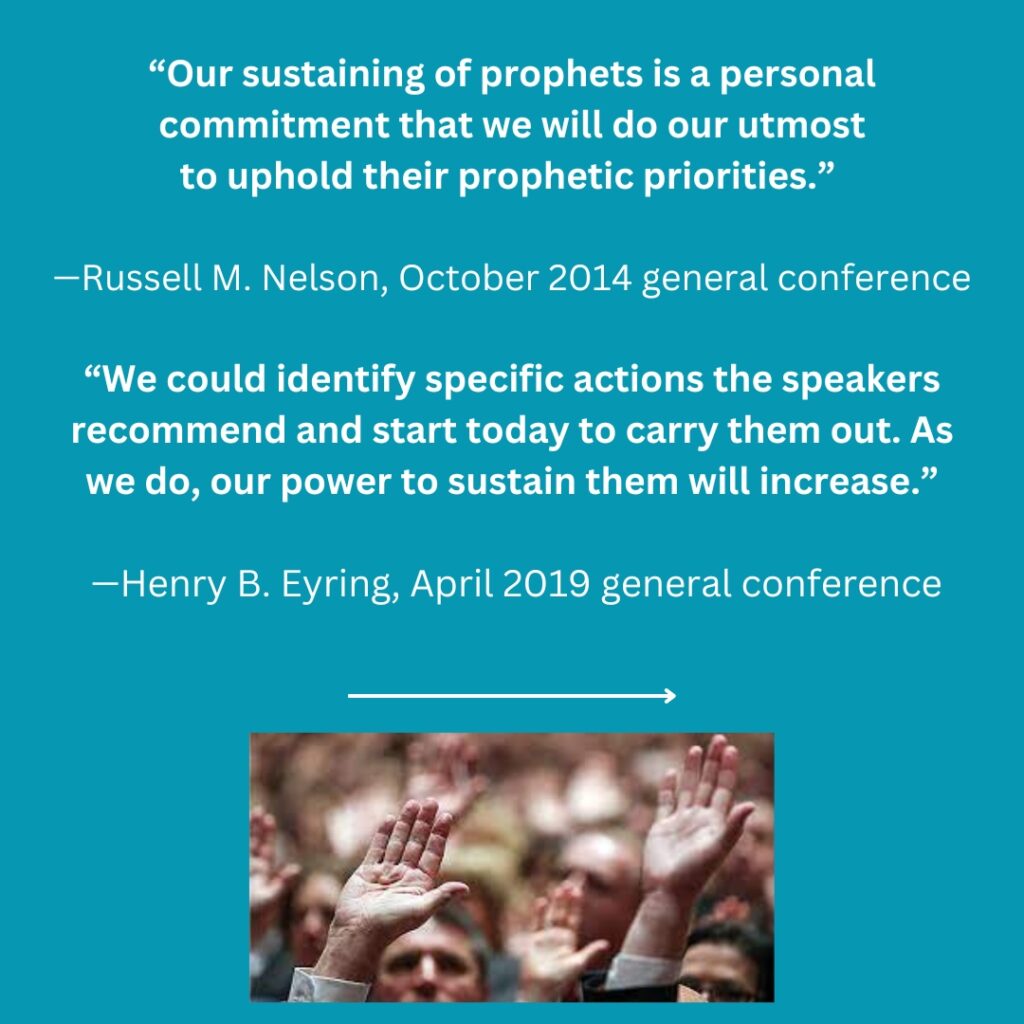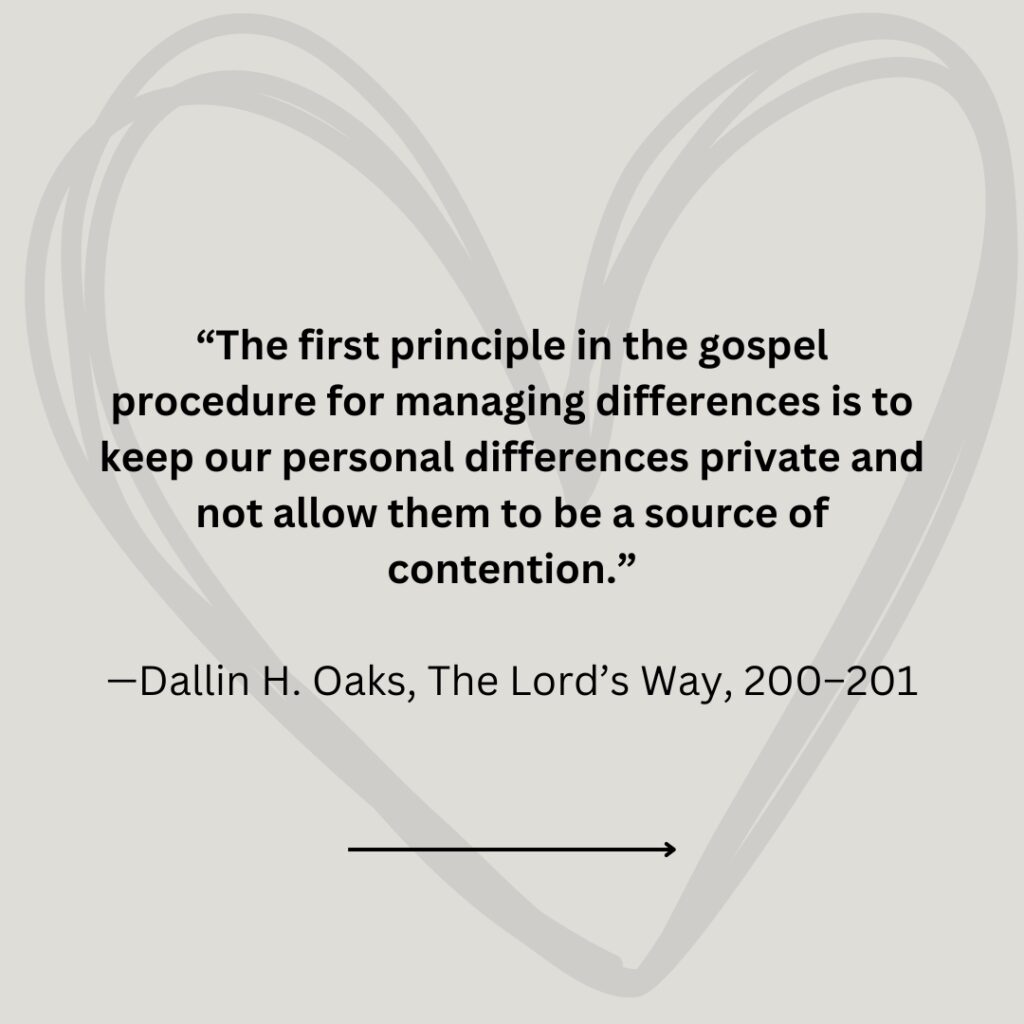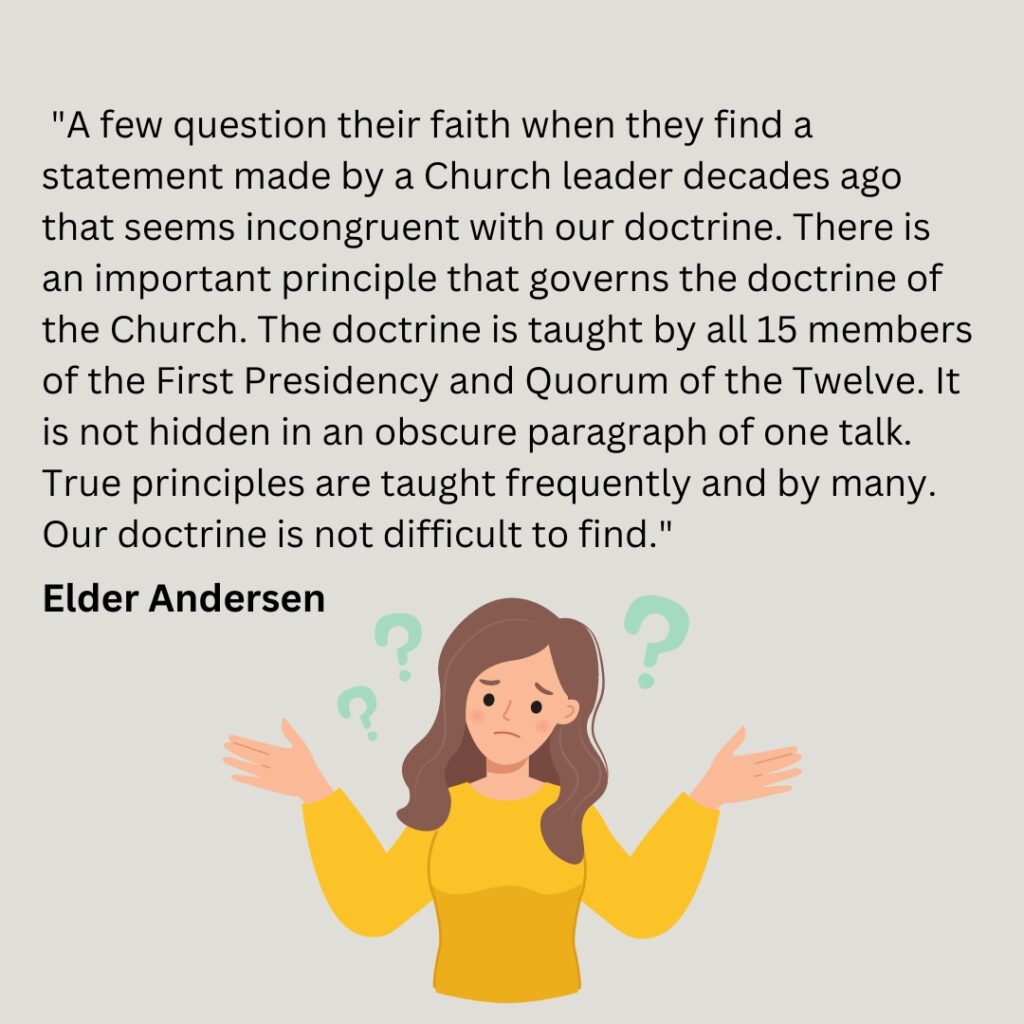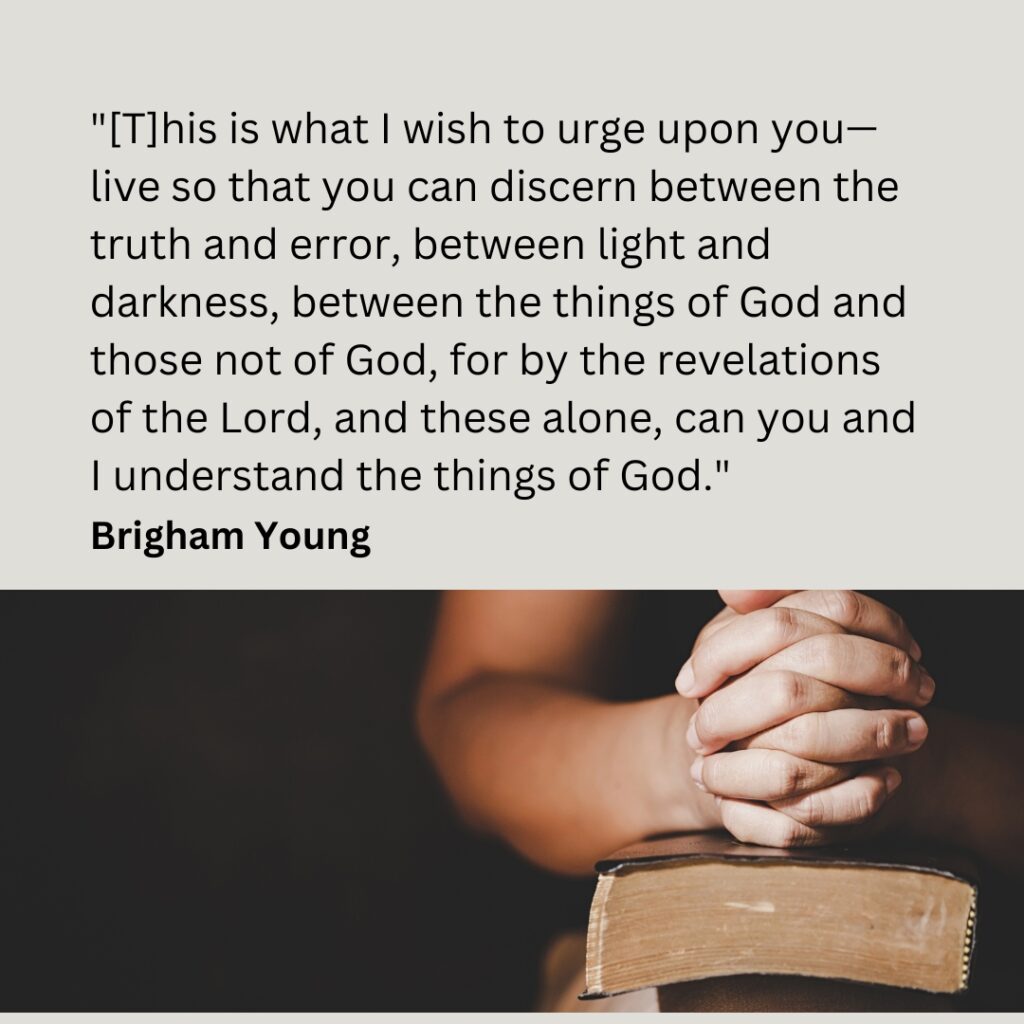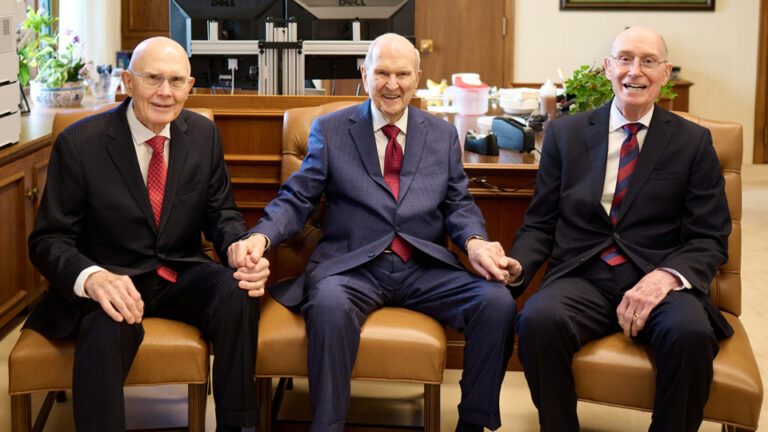
“In order for the messages of general conference to change our lives, we need to be willing to follow the counsel we hear. This willingness to take action on what we have learned opens the doors for marvelous blessings. Now listen to the blessings promised to those who heed: “For by doing these things the gates of hell shall not prevail against you; yea, and the Lord God will disperse the powers of darkness from before you, and cause the heavens to shake for your good.” Those are powerful promises that can keep us safe in these treacherous times. We need them, and the Lord will give them to each of us if we are willing to follow the prophets, seers, and revelators. Decide now to make general conference a priority in your life. Decide to listen carefully and follow the teachings that are given. Listen to or read the talks more than once to better understand and follow the counsel.”
Elder Paul V. Johnson “The Blessings of General Conference,” October 2005.
“Every six months, dating back to 1840, Latter-day Saints gather as a worldwide congregation to worship, sing and learn at the feet of leaders we consider living prophets. It’s a wonderful time full of the Spirit of God…Compared to many other Christians in the world, Latter-day Saints believe that God calls modern-day prophets to continue guiding the modern world, just as He did anciently. Our own Guide to the Scriptures defines a prophet as:
‘A person who has been called by and speaks for God. As a messenger of God, a prophet receives commandments, prophecies, and revelations from God. His responsibility is to make known God’s will and true character to mankind and to show the meaning of His dealings with them.’
“We count these leaders as an immeasurable blessing from God. Our confidence in the truthfulness of our scriptures and our doctrine comes, not alone from tradition nor external analysis, but from our faith that the Lord chose and raised up these servants for our day. More than just the head of the Church of Jesus Christ, we also consider the prophet as one the Lord has called to speak for Him in all the earth.” (Come Listen to a Prophet’s Voice, Robert Hill, 2022)

Prepare for Conference
General conference can be a feast of spiritual insights and revelation. To help you remember the spiritual experiences you had, you can write in your journal about what questions you had answered, what talks inspired you, and in what ways you want to improve. You can also share your thoughts with those you love. Think about how conference has brought you closer to Christ and what you will do to continue following Him and the words of His prophets. As President Henry B. Eyring, Second Counselor in the First Presidency, taught: “If you trust God enough to listen for His message in every sermon, song, and prayer in this conference, you will find it. And if you then go and do what He would have you do, your power to trust Him will grow, and in time you will be overwhelmed with gratitude to find that He has come to trust you.” (“Trust in God, Then Go and Do,” November 2010, 73)
Here are four ideas to help you prepare for General Conference:
- Ask questions and look for answers. We should approach general conference with questions in mind. “General Conference-No Ordinary Blessing” Ensign September 2011.
- Open your heart and mind and ‘Hear Him.’ Be open to messages God has for you.
- Learn more about the Special Witnesses of Jesus Christ.
- Invite others to participate in General Conference.






What if I don't agree with what is taught or said in General Conference?
“The Church is always growing and evolving. So, while gospel truths remain the same, Church policies and programs can sometimes change.
If those changes rub you the wrong way at first, don’t panic! Many people are naturally averse to any change. Feeling unsure doesn’t make you a bad disciple.”
Gospel Living “When you don’t agree with Church policy, try this.”
Four ideas for moving forward:
- Pray for confirmation
- Explore the topic
- Try acting on it
- Hold on to what you do know






Can I sustain the Prophet and my leaders even if I don't agree with them?
We are blessed to have prophets today who reveal God’s will for us. We are also blessed to have local leaders to counsel us. As we follow the counsel of our leaders, we receive God’s Spirit and power in our lives. To sustain our leaders means we do our best to act on their counsel. We also speak positively about them to others. Sometimes we may disagree with our leaders on a policy or course of action. We can take comfort in knowing that “we will inevitably have differences with those around us, including some we sustain as our leaders. The question is not whether we have such differences, but how we manage them” (Dallin H. Oaks, The Lord’s Way).
In summary, we can sustain our leaders even when we disagree with them. We can communicate our disagreements privately, then accept their decision and move forward. As we do so, the Lord will bless us with His Spirit and power.
In The Lord’s Way, Dallin H. Oaks suggested five ways to manage differences with Church Leaders:
- Overlook the difference and follow the leader.
- Reserve judgment and postpone acting on the difference.
- Communicate our differences privately to the leader.
- Communicate the difference privately to the person who oversees that leader.
- Pray for a resolution of the problem.

How do I know if the leadership of the church is speaking from their own opinion or if it was truly from God?
Nephi explained that the Lord speaks to all of us, including the prophets, according to our own language and understanding of the world (2 Nephi 31:3).
And as Keith Erekson said, “Every human is shaped by the language, customs, knowledge and experiences of individuals, families and societies, making it impossible for anyone — including prophets — to not be influenced by culture. … As the ‘mouthpiece’ of the Lord, they do not simply open their mouths and the word of God flows out. Sometimes revelation has come as dictated wording, but prophets also receive inspiration, feelings and impressions that they must put into words and actions.” (Expectations of a Prophet, Ensign College, Feb 01, 2022)
How we can know:
- Not every statement is doctrine.
- Doctrine is taught openly by all members of the First Presidency & Quorum of the Twelve.
- True principles are taught frequently and by many.
- We have the help of the Spirit.

What do I do if I'm offended by something said in General Conference?
General Conference is coming up and millions of Latter-Day Saints, me included, look forward to being taught, strengthened, and uplifted by our Prophet and other church leaders. But what if there is a message that I don’t find uplifting, perhaps even offensive? People are strange like that. If I get ten compliments and one criticism, I will remember that critical comment more than the ten nice things combined. It even tends to negate all the positive ones. For some, it can be similar with General Conference. If someone says something that bothers them, it can also ruin the whole conference experience and dwarf all the uplifting messages. Even worse, it can make us question our faith, since our General Authorities being inspired by God is one of the things that our faith is bad on, and it is hard to believe that something that seems fundamentally wrong to us can come from God.
Avoiding Offense
How can we avoid this? Perhaps we think there is nothing we can do because we cannot control what others say. But that attitude is not helpful because it makes the speaker the perpetrator and us the victim. In that case, the full responsibility of our offense lies with others. I don’t think that is a good approach, even though I don’t say it lightly, because there is much alertness and sensitivity about “victim blaming” these days.
Still, I do think that some perspective and balance is helpful. First, I don’t think anybody sets out to intently offend someone from the pulpit at General Conference. Secondly, I think that the gospel message is not supposed to merely consist of pleasant platitudes. After all, it is supposed to guide us towards exaltation and will necessarily contain some requirements along the way.
How does offense happen?
Regarding the first point, if someone does not mean to offend, why does it still happen? There can be many reasons for that and nuance rather than some sort of blame game is the appropriate way. I have sometimes reflected on the difficulty of the task for a General Conference speaker, who has to address millions of people from very different backgrounds and cultures and with very different personalities. How can they possibly prepare a message that applies to and uplifts everyone, especially if it is a difficult or controversial topic that also sometimes is necessary? The gospel message is for everyone, but how it is received depends both on how it is presented and where the recipient is coming from. We tend to have our favorite general authorities for a reason. Some tend to “speak to us” more than others.
Perhaps this seems uncomfortable, because we might falsely think that it somehow takes away from the revelatory component. If I am more uplifted by one speaker than another, do their words really come from revelation then, or just their different personalities? That is a false dichotomy, as far as I’m concerned. If the word of God were equally uplifting for everyone, we wouldn’t have favorite scriptures either. God speaks to his servants according to their language and uses them with their uniqueness as his vessels in the time and culture in which they are placed.
Lord, is it I?
But surely, they can say something that is uplifting only for some but still avoid offending the rest? Well, that depends. After the 1978 revelation to lift the priesthood ban was announced, a few members were seriously troubled and left the church over it. Today, that is almost incomprehensible, but they lived in a different culture. An irrelevant example, you might think. Those people were racists anyway and I would wholeheartedly support it if I were in their shoes, right? Perhaps, but in general we should be careful to claim that our offense is the one that is justified because we are always on the side of virtue and the offender, as well as others who are offended by other thing than me, are not. That is a position of pride that invalidates all other cultures, perspectives, and viewpoints as long as they do not align with ours. Going into General Conference with an open mind includes the preparation to have our preconceived notions challenged. “Lord, is it I?” is a difficult but helpful approach to avoid being offended and dealing with it in productive ways.
The other point about the gospel message containing the potential for offense, reminds me of Luke 7:23:
“And blessed is he, whosoever shall not be offended in me”.
Jesus says this in the context of his ministry: Performing miracles, healing the sick and preaching the gospel. At times, people were offended by what he did and said. (See e.g., John 6:61, Mark 6:3, Matthew 15:12).
A Stumbling Block
In both Greek and Hebrew, the word often translated into “offense” literally means “stumbling block.” Just like you trip over a stone, you trip over someone’s words or actions. The metaphor we sometimes use of life as a journey on a path leading to salvation is one that we have adopted from these ancient people and cultures. Tripping and falling could severely impede your progress on that journey. Taking offense would therefore always be done at your own peril.
Again, in retrospect it is easy to think that we obviously would not have been offended by Jesus had we been in the shoes of the people around him at the time. But they also came from a different background and culture than us and found some of Jesus’s teachings to go against their conventions. His motivation to preach and demonstrate the path to eternal life trumped whatever it took to just make people feel good. We too are inevitably influenced by our society in ways that may or may not align with the message of the restored gospel in general, and with the words spoken from the pulpit at General Conference in particular. Hopefully, we can approach the coming conference with humility and an open mind.




Keep General Conference With You
“Every April and October, we have the amazing opportunity to listen to modern-day prophets give us counsel directly from God. They prayerfully prepare their messages specifically for us—to guide us, teach us, answer us, and comfort us.
But after general conference ends and the days go by, remembering specific quotes, topics, promptings, or answers we received gets increasingly difficult. If we feel like we haven’t improved, we may start to feel discouraged as the next general conference approaches.”
Here are 5 ways to keep General Conference with you until next time!
- After conference, choose one quote, lesson, principle, or whole talk that inspired you.
- Share it with your family and write it down somewhere you will see it every day.
- Make a goal for how you will apply that principle to your life each day.
- Support each other. Being accountable to others is great motivation!
- When the next general conference approaches, sit down with your family and share what you’ve learned and the blessings you’ve received from applying this principle.
“If we work toward our specific spiritual goals, we will strengthen our testimonies and come closer to Heavenly Father.”




